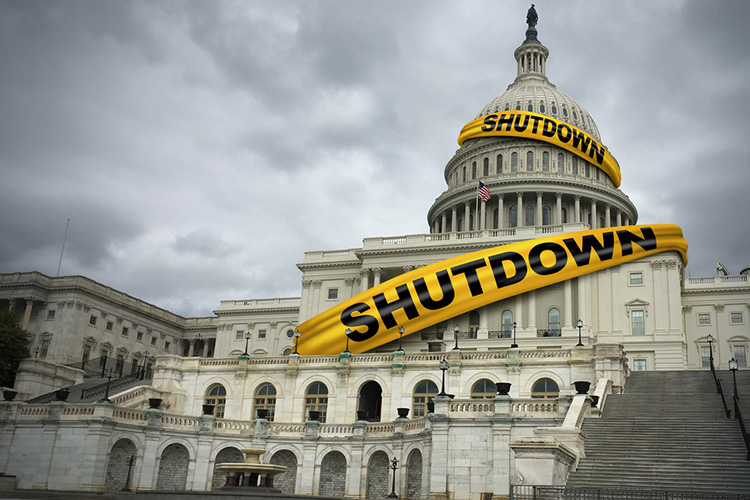The shutdown and Berkeley: Q&A with Vice Chancellor Randy Katz
The growing 'bubble in the pipeline' threatens ongoing and new projects, and the nation's leadership in science, says Berkeley's top administrator for research

January 22, 2019

Vice Chancellor for Research Randy Katz
As the longest federal government shutdown in U.S. history heads into a second month, Berkeley News talked with Vice Chancellor for Research Randy Katz, professor of electrical engineering and computer science, about how the standoff over President Trump’s border wall is affecting UC Berkeley’s research enterprise so far, and about what will happen if the shutdown continues much longer.
Which funders of UC Berkeley research are shut down and which are open?
The 2019 budgets for some agencies, like the National Institutes of Health, the Department of Defense and the Department of Energy, were approved by Congress before the shutdown and are not affected. Government agencies are funded by a series of separate bills that work their way through Congress, and some of them got through the gate before the president decided to shut the government down. Technically, the shutdown occurred as a consequence of the president not signing the bills that fund those agencies through to the end of September 2019.
But other large funders of UC Berkeley research had to close, including the National Science Foundation (NSF), NASA, the National Endowment for the Humanities/National Endowment for the Arts (NEH/NEA), the Department of Transportation, the Environmental Protection Agency and the Department of Agriculture. Among these agencies, Berkeley receives about $110 million dollars in funding from NSF and $46 million in funding from NASA. This is part of a total level of federal funding of about $422 million per year.
Is the campus feeling the effects?
The majority of research projects, supported by the open parts of the government, have received their funding for the year. However, for those parts of the government that are shut, the situation changes on a day-by-day basis. For example, just recently we learned that about 12 postdoctoral researchers paid directly by NSF will not receive their January paychecks. Campus is developing a strategy for loaning them funds to cover their missed paychecks. Some major centers at Berkeley, which receive incremental funding for their work throughout the fiscal year, are seeing their available funds lasting only through February. While the campus has a limited ability for these research projects to spend beyond their budgets, this is not sustainable in the long run and must be carefully watched. We have requested project leaders to work with their budgetary staffs to defer non-essential expenses where possible.
So far, we have had just one stop-work order from the California office of the Bureau and Land Management, on a five-year project for some research taking place at the UC Botanical Garden. This represents about a $1,500 loss in research funding for each month that the Department of the Interior is closed. Luckily, there are other things that the researchers can work on for a month. But if this lasts for six months, that’s another story.
The second situation we heard about in the media, which reported that a postdoc in botany was about to leave for fieldwork in Riverside County, but the site is closed because of the shutdown, and he hasn’t received a permit from the U.S. Forest Service. My staff is tracking that postdoc down to find out more.
A much bigger problem is that, for Berkeley faculty who have submitted applications for a second year of funding to the federal agencies subject to the shutdown, or who have submitted proposals for new projects, the entire award bureaucracy — the people in Washington who, over course of about eight or nine months, accept new proposals, send them on for review, interpret the reviews and decide what to fund have largely been sent home.
How long before the impacts are greater?
If the shutdown goes on, my sense is that, in two to three months, people’s funding won’t run dry, but delays will be happening in the important parts of government that accept and evaluate research proposals. It will take a long time for them to catch up, and that hiatus will have serious implications down the road.
And what do we do when the funding for an old project ends, and a new project should begin, but there’s a delay, and you can’t pay the students in the lab, the staff, the postdocs who are ready to work on the next step in the research? Of course, they’ll have access to the lab and the library, but they might not have supplies, financial support for what’s needed for their experiments, money to help pay for their living expenses. Those bills must be paid on a monthly basis.
Imagine that a set of projects supporting the work in your lab or in a remote research location is a pipeline. You can’t really keep your operation going if what we engineers call “a bubble in the pipeline” — in this case, one caused by a three-month delay in government functions — occurs.
If Washington’s shut down for a month, and opens tomorrow, the award bureaucracy could probably make up for the time lost. Employees might work hard, double-time, because if research money that’s been appropriated and authorized by Congress isn’t applied in the best possible ways by the end of the fiscal year, bad things will happen to their agencies.
But in the case of a multi-month delay, these are human beings, in Washington, who can only do so much. For example, proposals submitted in the fall take about eight or nine months to be processed, evaluated and decided, and researchers learn if they’ll be granted new money at the beginning of the summer.
How will a prolonged shutdown affect university research nationwide?
Maybe this whole situation will be worked out tomorrow, so why scare the life out of people? We don’t want to do that, but with each passing day, the potential to permanently damage the national university research enterprise increases. Young scholars will get discouraged from pursuing careers in research. Scholarly exchanges through conferences will get curtailed. Projects will be interrupted, and experimental knowledge will be lost. As this is the longest shutdown in U.S. history, only in retrospect will we understand the full effect of its impact.
Our researchers who work on NASA projects are like contractors building complex instruments to put in space to understand the universe. If the Space Sciences Lab can’t fund them, those people will look for other jobs, and then we lose the capability of furthering our expertise in space exploration. And we live in a very competitive international environment where our scientists and engineers need to keep ahead, or other countries will overtake us.
If people decide to leave the field, the scientific brain trust, we will sacrifice our ability to be in the forefront of science and scholarship. Once we cede leadership in science, we will handicap our nation’s ability to stay ahead.
How is Berkeley helping its researchers during the shutdown?
Campus Shared Services and department and unit research administrators are continuing to help principal investigators develop their research proposals. The Sponsored Projects Office is reviewing and submitting proposals to the federal sponsors that are accepting proposals during the shutdown. The SPO also has created a web page detailing the impact of the shutdown on sponsored projects that includes links to specific agency guidelines for principal investigators.
Research administrators affiliated with Campus Shared Services, as well as the campus’s departments and research units, also are assisting principal investigators in monitoring research expenditures during this period, and Contracts and Grants Accounting is invoicing federal sponsors as scheduled through various payment systems that are still active. Payments on these invoices may still be delayed or otherwise impacted, even if the systems are accepting invoices and payment requests.
If researchers receive notices from federal sponsors related to the shutdown, they should notify SPO as soon as possible. Principal investigators also may contact their contract and grant officer in SPO with any questions about how a specific federal agency is dealing with the shutdown. And if any problems emerge with the administration of their projects, they should contact my office, the Office of the Vice Chancellor for Research. Otherwise, it’s very difficult for us to become aware of issues happening at the grass roots of the campus. We aren’t receiving messages from the NSF, for example. It’s the investigators themselves being contacted.
NOTE: Vice Chancellor Katz sent a letter to the campus community on this subject on Jan. 19.